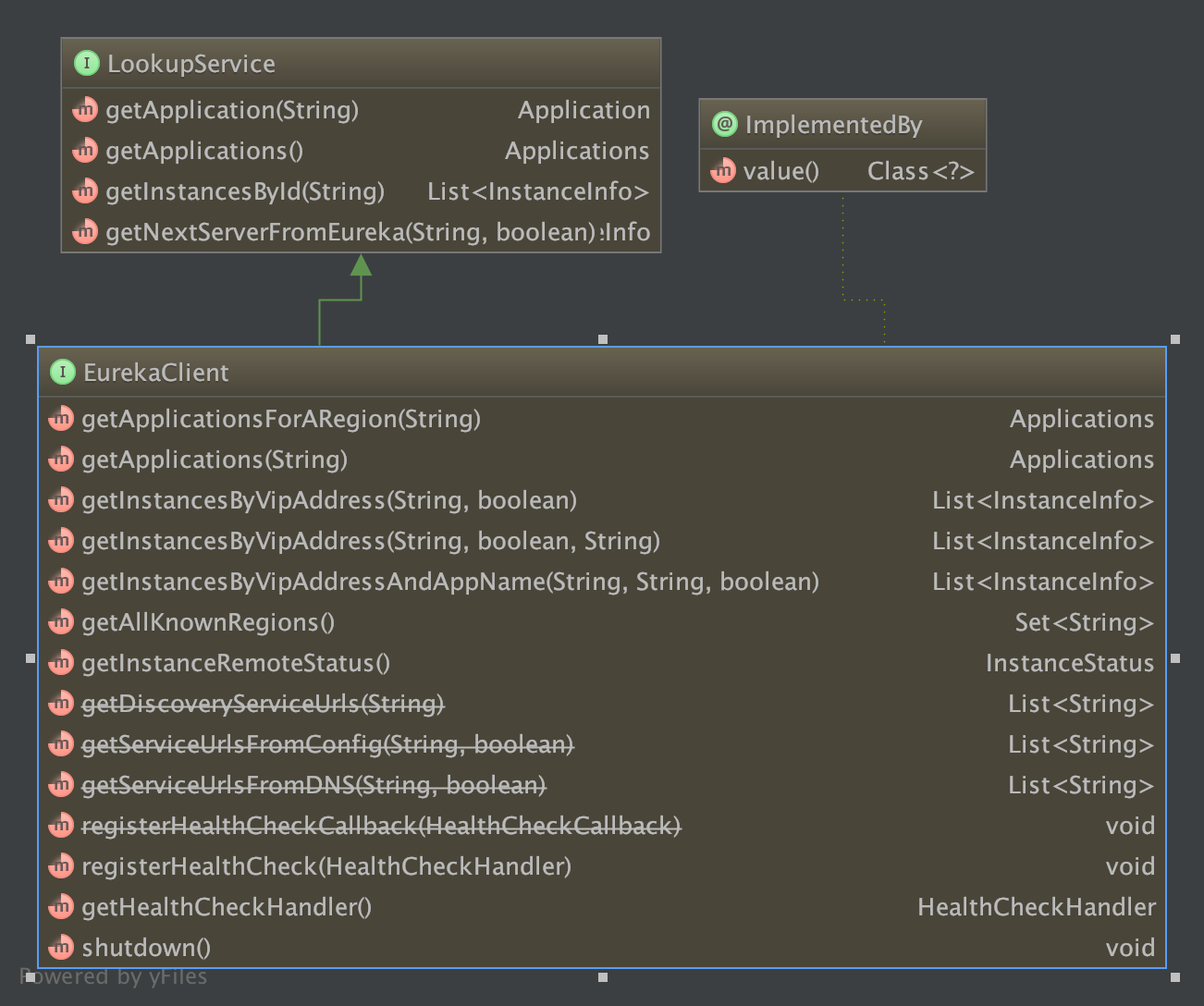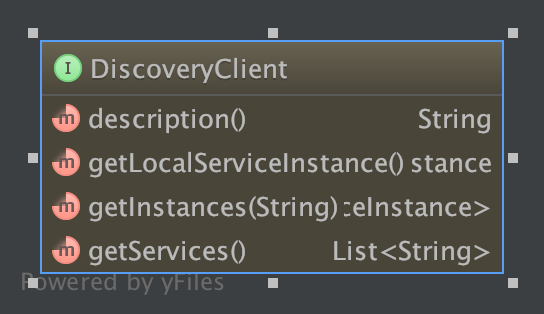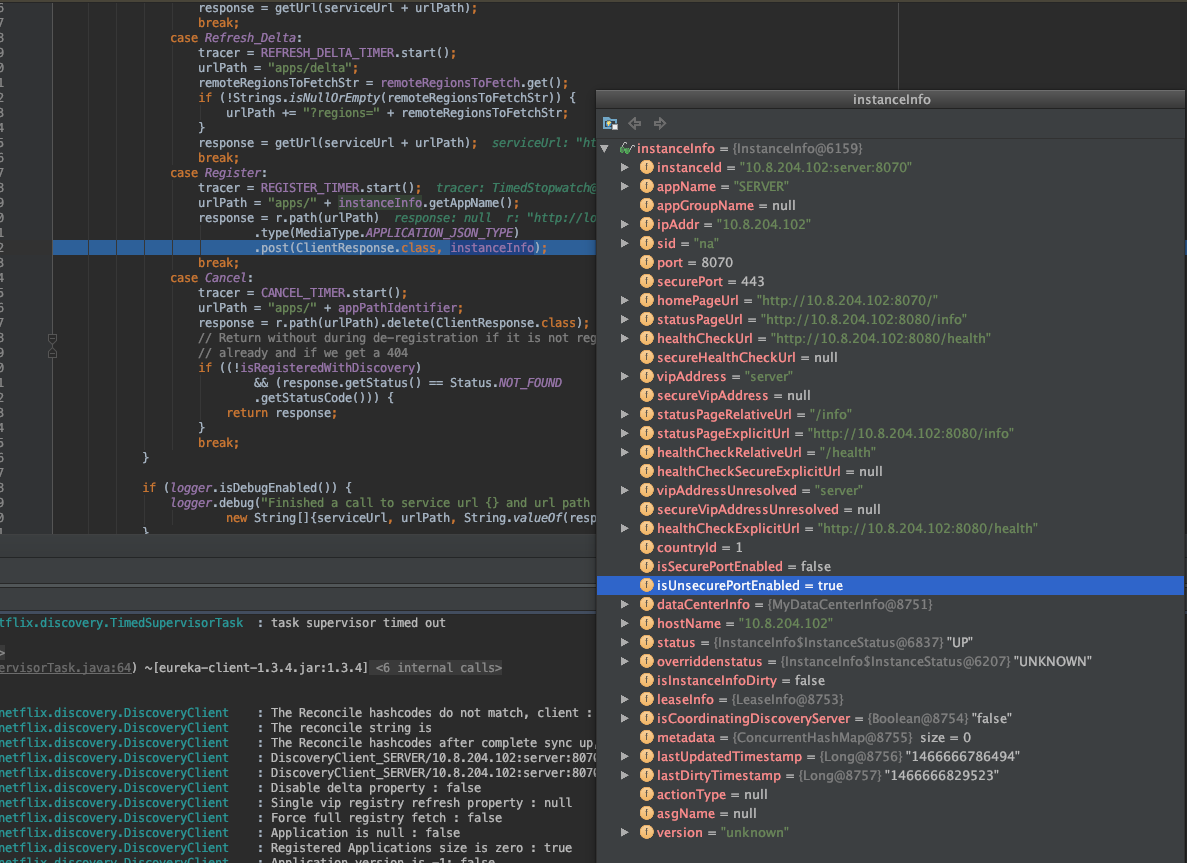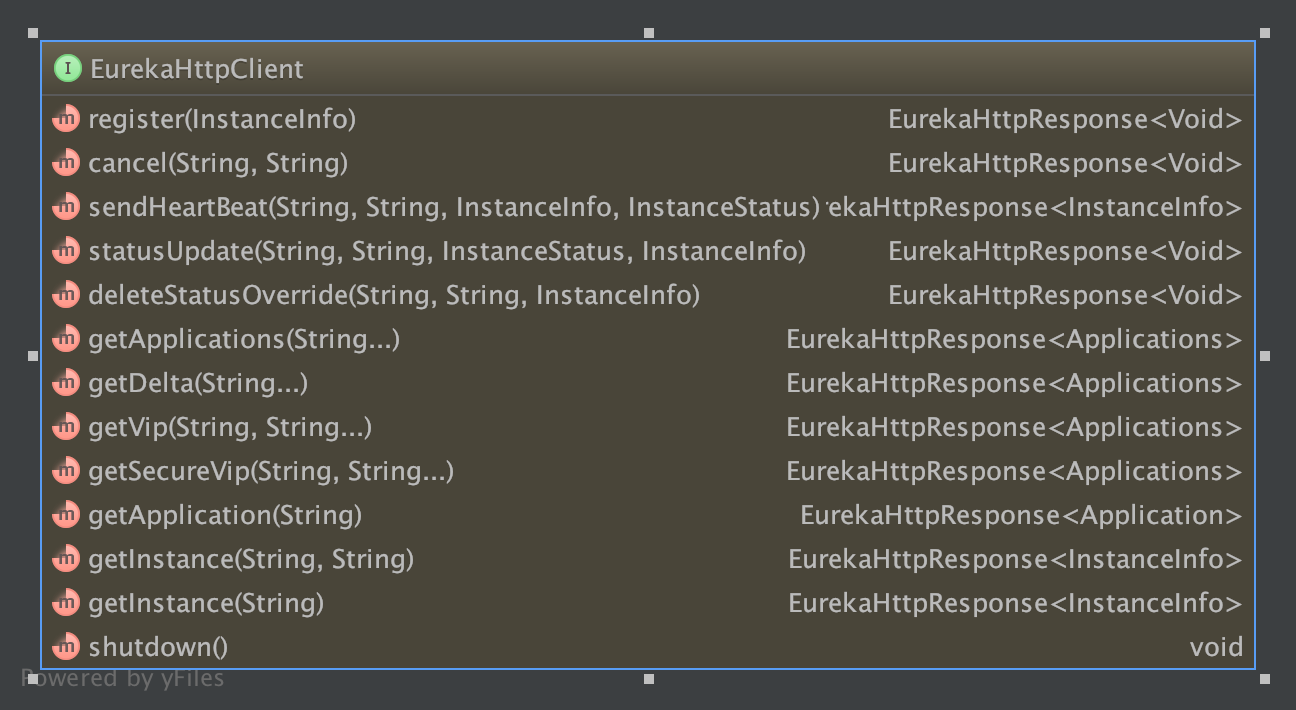Eureka 服务器客户端相关配置
1.建立eureka服务器
只需要使用@EnableEurekaServer注解就可以让应用变为Eureka服务器,这是因为spring boot封装了Eureka Server,让你可以嵌入到应用中直接使用。至于真正的EurekaServer是Netflix公司的开源项目,也是可以单独下载使用的
@SpringBootApplication
@EnableEurekaServer
public class EurekaServer {
public static void main(String[] args) {
SpringApplication.run(EurekaServer.class, args);
}
}
在application.properties配置文件中使用如下配置:
server.port=8761
eureka.instance.hostname=localhost
eureka.client.registerWithEureka=false
eureka.client.fetchRegistry=false
eureka.client.serviceUrl.defaultZone=http://${eureka.instance.hostname}:${server.port}/eureka/
其中server.port配置eureka服务器端口号。Eureka的配置属性都在开源项目spring-cloud-netflix-master中定义,在这个项目中有两个类EurekaInstanceConfigBean 和EurekaClientConfigBean,分别含有eureka.instance和eureka.client相关属性的解释和定义。从中可以看到,registerWithEureka表示是否注册自身到eureka服务器,因为当前这个应用就是eureka服务器,没必要注册自身,所以这里是false。fetchRegistry表示是否从eureka服务器获取注册信息,同上,这里不需要。defaultZone就比较重要了,是设置eureka服务器所在的地址,查询服务和注册服务都需要依赖这个地址
2.让服务使用eureka服务器
让服务使用eureka服务器,只需添加@EnableDiscoveryClient注解就可以了。在main方法所在的Application类中,添加@EnableDiscoveryClient注解。然后在配置文件中添加:
eureka.client.serviceUrl.defaultZone=http://localhost:8761/eureka/
spring.application.name=simple-service
pom文件需要增加:
<dependency>
<groupId>org.springframework.cloud</groupId>
<artifactId>spring-cloud-starter-eureka-server</artifactId>
</dependency>
其中defaultZone是指定eureka服务器的地址,无论是注册还是发现服务都需要这个地址。application.name是指定进行服务注册时该服务的名称。这个名称就是后面调用服务时的服务标识符,pom文件需要增加:
<dependency>
<groupId>org.springframework.cloud</groupId>
<artifactId>spring-cloud-starter-eureka</artifactId>
</dependency>
如此以来该服务启动后会自动注册到eureka服务器。如果在该服务中还需要调用别的服务,那么直接使用那个服务的服务名称加方法名构成的url即可。
Eureka Client 客户端 服务注册发现接口
Netxflix 提供的主要操作定义在com.netflix.discovery.EurekaClient中。主要操作有

其实现类是 com.netflix.discovery.DiscoveryClient。
Spring cloud中对其进行了封装,定义在org.springframework.cloud.client.discovery.DiscoveryClient中

服务发现核心类DiscoveryClient(Netflix 非 Spring)
最核心的一个构造方法
@Inject //google guice 注入遵循 JSR-330规范
DiscoveryClient(ApplicationInfoManager applicationInfoManager, EurekaClientConfig config, DiscoveryClientOptionalArgs args,
Provider<BackupRegistry> backupRegistryProvider) {
if (args != null) {
this.healthCheckHandlerProvider = args.healthCheckHandlerProvider;
this.healthCheckCallbackProvider = args.healthCheckCallbackProvider;
this.eventBus = args.eventBus;
this.discoveryJerseyClient = args.eurekaJerseyClient;
} else {
this.healthCheckCallbackProvider = null;
this.healthCheckHandlerProvider = null;
this.eventBus = null;
this.discoveryJerseyClient = null;
}
this.applicationInfoManager = applicationInfoManager;
InstanceInfo myInfo = applicationInfoManager.getInfo();
this.backupRegistryProvider = backupRegistryProvider;
try {
scheduler = Executors.newScheduledThreadPool(3,
new ThreadFactoryBuilder()
.setNameFormat("DiscoveryClient-%d")
.setDaemon(true)
.build());
clientConfig = config;
staticClientConfig = clientConfig;
transportConfig = config.getTransportConfig();
instanceInfo = myInfo;
if (myInfo != null) {
appPathIdentifier = instanceInfo.getAppName() + "/" + instanceInfo.getId();
} else {
logger.warn("Setting instanceInfo to a passed in null value");
}
this.urlRandomizer = new EndpointUtils.InstanceInfoBasedUrlRandomizer(instanceInfo);
String[] availZones = clientConfig.getAvailabilityZones(clientConfig.getRegion());
final String zone = InstanceInfo.getZone(availZones, myInfo);
localRegionApps.set(new Applications());
heartbeatExecutor = new ThreadPoolExecutor(
1, clientConfig.getHeartbeatExecutorThreadPoolSize(), 0, TimeUnit.SECONDS,
new SynchronousQueue<Runnable>()); // use direct handoff
cacheRefreshExecutor = new ThreadPoolExecutor(
1, clientConfig.getCacheRefreshExecutorThreadPoolSize(), 0, TimeUnit.SECONDS,
new SynchronousQueue<Runnable>()); // use direct handoff
fetchRegistryGeneration = new AtomicLong(0);
clientAccept = EurekaAccept.fromString(clientConfig.getClientDataAccept());
eurekaTransport = new EurekaTransport();
scheduleServerEndpointTask(eurekaTransport, zone);
if (discoveryJerseyClient == null) { // if not injected, create one
EurekaJerseyClientBuilder clientBuilder = new EurekaJerseyClientBuilder()
.withUserAgent("Java-EurekaClient")
.withConnectionTimeout(clientConfig.getEurekaServerConnectTimeoutSeconds() * 1000)
.withReadTimeout(clientConfig.getEurekaServerReadTimeoutSeconds() * 1000)
.withMaxConnectionsPerHost(clientConfig.getEurekaServerTotalConnectionsPerHost())
.withMaxTotalConnections(clientConfig.getEurekaServerTotalConnections())
.withConnectionIdleTimeout(clientConfig.getEurekaConnectionIdleTimeoutSeconds())
.withEncoder(clientConfig.getEncoderName())
.withDecoder(clientConfig.getDecoderName(), clientConfig.getClientDataAccept());
if (eurekaServiceUrls.get().get(0).startsWith("https://") &&
"true".equals(System.getProperty("com.netflix.eureka.shouldSSLConnectionsUseSystemSocketFactory"))) {
clientBuilder.withClientName("DiscoveryClient-HTTPClient-System")
.withSystemSSLConfiguration();
} else if (clientConfig.getProxyHost() != null && clientConfig.getProxyPort() != null) {
clientBuilder.withClientName("Proxy-DiscoveryClient-HTTPClient")
.withProxy(
clientConfig.getProxyHost(), clientConfig.getProxyPort(),
clientConfig.getProxyUserName(), clientConfig.getProxyPassword()
);
} else {
clientBuilder.withClientName("DiscoveryClient-HTTPClient");
}
discoveryJerseyClient = clientBuilder.build();
}
discoveryApacheClient = discoveryJerseyClient.getClient();
remoteRegionsToFetch = new AtomicReference<String>(clientConfig.fetchRegistryForRemoteRegions());
remoteRegionsRef = new AtomicReference<>(remoteRegionsToFetch.get() == null ? null : remoteRegionsToFetch.get().split(","));
AzToRegionMapper azToRegionMapper;
if (clientConfig.shouldUseDnsForFetchingServiceUrls()) {
azToRegionMapper = new DNSBasedAzToRegionMapper(clientConfig);
} else {
azToRegionMapper = new PropertyBasedAzToRegionMapper(clientConfig);
}
if (null != remoteRegionsToFetch.get()) {
azToRegionMapper.setRegionsToFetch(remoteRegionsToFetch.get().split(","));
}
instanceRegionChecker = new InstanceRegionChecker(azToRegionMapper, clientConfig.getRegion());
boolean enableGZIPContentEncodingFilter = config.shouldGZipContent();
// should we enable GZip decoding of responses based on Response
// Headers?
if (enableGZIPContentEncodingFilter) {
// compressed only if there exists a 'Content-Encoding' header
// whose value is "gzip"
discoveryApacheClient.addFilter(new GZIPContentEncodingFilter(false));
}
// always enable client identity headers
String ip = instanceInfo == null ? null : instanceInfo.getIPAddr();
EurekaClientIdentity identity = new EurekaClientIdentity(ip);
discoveryApacheClient.addFilter(new EurekaIdentityHeaderFilter(identity));
// add additional ClientFilters if specified
if (args != null && args.additionalFilters != null) {
for (ClientFilter filter : args.additionalFilters) {
discoveryApacheClient.addFilter(filter);
}
}
} catch (Throwable e) {
throw new RuntimeException("Failed to initialize DiscoveryClient!", e);
}
if (clientConfig.shouldFetchRegistry() && !fetchRegistry(false)) {
fetchRegistryFromBackup();
}
initScheduledTasks();
try {
Monitors.registerObject(this);
} catch (Throwable e) {
logger.warn("Cannot register timers", e);
}
this.heartbeatStalenessMonitor = new ThresholdLevelsMetric(this, METRIC_REGISTRATION_PREFIX + "lastHeartbeatSec_", new long[]{15L, 30L, 60L, 120L, 240L, 480L});
this.registryStalenessMonitor = new ThresholdLevelsMetric(this, METRIC_REGISTRY_PREFIX + "lastUpdateSec_", new long[]{15L, 30L, 60L, 120L, 240L, 480L});
// This is a bit of hack to allow for existing code using DiscoveryManager.getInstance()
// to work with DI'd DiscoveryClient
DiscoveryManager.getInstance().setDiscoveryClient(this);
DiscoveryManager.getInstance().setEurekaClientConfig(config);
initTimestampMs = System.currentTimeMillis();
}
其中有初始化 部分定时任务的(心跳任务、获取注册信息任务)
client.refresh.interval 30 任务执行间隔
/**
* Initializes all scheduled tasks.
*/
private void initScheduledTasks() {
if (clientConfig.shouldFetchRegistry()) {
// registry cache refresh timer
int registryFetchIntervalSeconds = clientConfig.getRegistryFetchIntervalSeconds();
int expBackOffBound = clientConfig.getCacheRefreshExecutorExponentialBackOffBound();
scheduler.schedule(
new TimedSupervisorTask(
"cacheRefresh",
scheduler,
cacheRefreshExecutor,
registryFetchIntervalSeconds,
TimeUnit.SECONDS,
expBackOffBound,
new CacheRefreshThread()
),
registryFetchIntervalSeconds, TimeUnit.SECONDS);
}
if (shouldRegister(instanceInfo)) {
int renewalIntervalInSecs = instanceInfo.getLeaseInfo().getRenewalIntervalInSecs();
int expBackOffBound = clientConfig.getHeartbeatExecutorExponentialBackOffBound();
logger.info("Starting heartbeat executor: " + "renew interval is: " + renewalIntervalInSecs);
// Heartbeat timer
scheduler.schedule(
new TimedSupervisorTask(
"heartbeat",
scheduler,
heartbeatExecutor,
renewalIntervalInSecs,
TimeUnit.SECONDS,
expBackOffBound,
new HeartbeatThread()
),
renewalIntervalInSecs, TimeUnit.SECONDS);
// InstanceInfo replicator
instanceInfoReplicator = new InstanceInfoReplicator(
this,
instanceInfo,
clientConfig.getInstanceInfoReplicationIntervalSeconds(),
2); // burstSize
statusChangeListener = new ApplicationInfoManager.StatusChangeListener() {
@Override
public String getId() {
return "statusChangeListener";
}
@Override
public void notify(StatusChangeEvent statusChangeEvent) {
if (InstanceStatus.DOWN == statusChangeEvent.getStatus() ||
InstanceStatus.DOWN == statusChangeEvent.getPreviousStatus()) {
// log at warn level if DOWN was involved
logger.warn("Saw local status change event {}", statusChangeEvent);
} else {
logger.info("Saw local status change event {}", statusChangeEvent);
}
instanceInfoReplicator.onDemandUpdate();
}
};
if (clientConfig.shouldOnDemandUpdateStatusChange()) {
applicationInfoManager.registerStatusChangeListener(statusChangeListener);
}
instanceInfoReplicator.start(clientConfig.getInitialInstanceInfoReplicationIntervalSeconds());
} else {
logger.info("Not registering with Eureka server per configuration");
}
}
a. HeartbeatThread 心跳任务 (心跳线程默认30秒一次 第一次心跳即为第一次注册)
其中 renew() 方法 为核心方法 ,此心跳机制用来通知Eureka Server 该服务状态正常.如果超过90秒仍然连接失败则此服务会被Eureka Server 从服务注册表移除。此30秒默认间隔不建议调整。
/**
* Renew with the eureka service by making the appropriate REST call
* transport.query.enabled 此属性是否为true决定了
* 是由 EurekaHttpClient
*/
boolean renew() {
if (shouldUseExperimentalTransportForRegistration()) {
EurekaHttpResponse<InstanceInfo> httpResponse;
try {
httpResponse = eurekaTransport.registrationClient.sendHeartBeat(instanceInfo.getAppName(), instanceInfo.getId(), instanceInfo, null);
logger.debug("{} - Heartbeat status: {}", PREFIX + appPathIdentifier, httpResponse.getStatusCode());
if (httpResponse.getStatusCode() == 404) {
REREGISTER_COUNTER.increment();
logger.info("{} - Re-registering apps/{}", PREFIX + appPathIdentifier, instanceInfo.getAppName());
return register();
}
return httpResponse.getStatusCode() == 200;
} catch (Throwable e) {
logger.error("{} - was unable to send heartbeat!", PREFIX + appPathIdentifier, e);
return false;
}
} else {
ClientResponse response = null;
try {
response = makeRemoteCall(Action.Renew);
logger.debug("{} - Heartbeat status: {}", PREFIX + appPathIdentifier, (response != null ? response.getStatus() : "not sent"));
if (response == null) {
return false;
}
if (response.getStatus() == 404) {
REREGISTER_COUNTER.increment();
logger.info("{} - Re-registering apps/{}", PREFIX + appPathIdentifier, instanceInfo.getAppName());
return register();
}
} catch (Throwable e) {
logger.error("{} - was unable to send heartbeat!", PREFIX + appPathIdentifier, e);
return false;
} finally {
if (response != null) {
response.close();
}
}
return true;
}
}
/**
* Register with the eureka service by making the appropriate REST call.
*/
boolean register() throws Throwable {
logger.info(PREFIX + appPathIdentifier + ": registering service...");
if (shouldUseExperimentalTransportForRegistration()) {
EurekaHttpResponse<Void> httpResponse;
try {
httpResponse = eurekaTransport.registrationClient.register(instanceInfo);
} catch (Exception e) {
logger.warn("{} - registration failed {}", PREFIX + appPathIdentifier, e.getMessage(), e);
throw e;
}
isRegisteredWithDiscovery = true;
if (logger.isInfoEnabled()) {
logger.info("{} - registration status: {}", PREFIX + appPathIdentifier, httpResponse.getStatusCode());
}
return httpResponse.getStatusCode() == 204;
} else {
ClientResponse response = null;
try {
response = makeRemoteCall(Action.Register);
isRegisteredWithDiscovery = true;
logger.info("{} - registration status: {}", PREFIX + appPathIdentifier, (response != null ? response.getStatus() : "not sent"));
return response != null && response.getStatus() == 204;
} catch (Throwable e) {
logger.warn("{} - registration failed {}", PREFIX + appPathIdentifier, e.getMessage(), e);
throw e;
} finally {
closeResponse(response);
}
}
}
注册时所传信息 如下:

b.CacheRefreshThread 获取所有服务注册信息的定时任务
获取远端注册信息,根据参数会决定是调用getAndStoreFullRegistry()或者getAndUpdateDelta(applications)获取服务端的注册信息刷新client的缓存
第一次获取到所有服务的注册信息后会将其缓存到本地(getAndStoreFullRegistry()),
存放容器为 DiscoveryClient 中的 AtomicReference
private final AtomicReference<Applications> localRegionApps =
new AtomicReference<Applications>();
/**
* The task that fetches the registry information at specified intervals.
*
*/
class CacheRefreshThread implements Runnable {
public void run() {
try {
boolean isFetchingRemoteRegionRegistries = isFetchingRemoteRegionRegistries();
boolean remoteRegionsModified = false;
// This makes sure that a dynamic change to remote regions to fetch is honored.
String latestRemoteRegions = clientConfig.fetchRegistryForRemoteRegions();
if (null != latestRemoteRegions) {
String currentRemoteRegions = remoteRegionsToFetch.get();
if (!latestRemoteRegions.equals(currentRemoteRegions)) {
// Both remoteRegionsToFetch and AzToRegionMapper.regionsToFetch need to be in sync
synchronized (instanceRegionChecker.getAzToRegionMapper()) {
if (remoteRegionsToFetch.compareAndSet(currentRemoteRegions, latestRemoteRegions)) {
String[] remoteRegions = latestRemoteRegions.split(",");
remoteRegionsRef.set(remoteRegions);
instanceRegionChecker.getAzToRegionMapper().setRegionsToFetch(remoteRegions);
remoteRegionsModified = true;
} else {
logger.info("Remote regions to fetch modified concurrently," +
" ignoring change from {} to {}", currentRemoteRegions, latestRemoteRegions);
}
}
} else {
// Just refresh mapping to reflect any DNS/Property change
instanceRegionChecker.getAzToRegionMapper().refreshMapping();
}
}
boolean success = fetchRegistry(remoteRegionsModified);
if (success) {
registrySize = localRegionApps.get().size();
lastSuccessfulRegistryFetchTimestamp = System.currentTimeMillis();
}
if (logger.isDebugEnabled()) {
StringBuilder allAppsHashCodes = new StringBuilder();
allAppsHashCodes.append("Local region apps hashcode: ");
allAppsHashCodes.append(localRegionApps.get().getAppsHashCode());
allAppsHashCodes.append(", is fetching remote regions? ");
allAppsHashCodes.append(isFetchingRemoteRegionRegistries);
for (Map.Entry<String, Applications> entry : remoteRegionVsApps.entrySet()) {
allAppsHashCodes.append(", Remote region: ");
allAppsHashCodes.append(entry.getKey());
allAppsHashCodes.append(" , apps hashcode: ");
allAppsHashCodes.append(entry.getValue().getAppsHashCode());
}
logger.debug("Completed cache refresh task for discovery. All Apps hash code is {} ",
allAppsHashCodes.toString());
}
} catch (Throwable th) {
logger.error("Cannot fetch registry from server", th);
}
}
}
/**
* Fetches the registry information.
*
* <p>
* This method tries to get only deltas after the first fetch unless there
* is an issue in reconciling eureka server and client registry information.
* </p>
*
* @param forceFullRegistryFetch Forces a full registry fetch.
*
* @return true if the registry was fetched
*/
private boolean fetchRegistry(boolean forceFullRegistryFetch) {
Stopwatch tracer = FETCH_REGISTRY_TIMER.start();
try {
// If the delta is disabled or if it is the first time, get all
// applications
Applications applications = getApplications();
if (clientConfig.shouldDisableDelta()
|| (!Strings.isNullOrEmpty(clientConfig.getRegistryRefreshSingleVipAddress()))
|| forceFullRegistryFetch
|| (applications == null)
|| (applications.getRegisteredApplications().size() == 0)
|| (applications.getVersion() == -1)) //Client application does not have latest library supporting delta
{
logger.info("Disable delta property : {}", clientConfig.shouldDisableDelta());
logger.info("Single vip registry refresh property : {}", clientConfig.getRegistryRefreshSingleVipAddress());
logger.info("Force full registry fetch : {}", forceFullRegistryFetch);
logger.info("Application is null : {}", (applications == null));
logger.info("Registered Applications size is zero : {}",
(applications.getRegisteredApplications().size() == 0));
logger.info("Application version is -1: {}", (applications.getVersion() == -1));
getAndStoreFullRegistry();
} else {
getAndUpdateDelta(applications);
}
applications.setAppsHashCode(applications.getReconcileHashCode());
logTotalInstances();
} catch (Throwable e) {
logger.error(PREFIX + appPathIdentifier + " - was unable to refresh its cache! status = " + e.getMessage(), e);
return false;
} finally {
if (tracer != null) {
tracer.stop();
}
}
// Notify about cache refresh before updating the instance remote status
onCacheRefreshed();
// Update remote status based on refreshed data held in the cache
updateInstanceRemoteStatus();
// registry was fetched successfully, so return true
return true;
}
上文getAndStoreFullRegistry() 里面有个httpclient

com.netflix.discovery.shared.transport.jersey.AbstractJerseyEurekaHttpClient.getApplications其实就是发起一个Rest请求
@Override
public EurekaHttpResponse<Applications> getApplications(String… regions) {
return getApplicationsInternal(“apps/”, regions);
}
private EurekaHttpResponse<Applications> getApplicationsInternal(String urlPath, String[] regions) {
WebResource webResource = jerseyClient.resource(serviceUrl).path(urlPath);
regionsParamValue = StringUtil.join(regions);
webResource = webResource.queryParam("regions", regionsParamValue);
Builder requestBuilder = webResource.getRequestBuilder();
addExtraHeaders(requestBuilder);
response = requestBuilder.accept(MediaType.APPLICATION_JSON_TYPE).get(ClientResponse.class);
}
Eureka Server 服务端
1.服务端接受请求
可以看到服务端的也是开放一个rest接口
@POST
@Consumes({“application/json”, “application/xml”})
public Response addInstance(InstanceInfo info,
@HeaderParam(PeerEurekaNode.HEADER_REPLICATION) String isReplication) {
logger.debug(“Registering instance {} (replication={})”, info.getId(), isReplicat
registry.register(info, “true”.equals(isReplication));
}
2.执行注册com.netflix.eureka.registry.PeerAwareInstanceRegistryImpl.register(InstanceInfo info, boolean isReplication)
/**
* Registers the information about the {@link InstanceInfo} and replicates
* this information to all peer eureka nodes. If this is replication event
* from other replica nodes then it is not replicated.
*
* @param info
* the {@link InstanceInfo} to be registered and replicated.
* @param isReplication
* true if this is a replication event from other replica nodes,
* false otherwise.
*/
@Override
public void register(final InstanceInfo info, final boolean isReplication) {
int leaseDuration = Lease.DEFAULT_DURATION_IN_SECS;
if (info.getLeaseInfo() != null && info.getLeaseInfo().getDurationInSecs() > 0) {
leaseDuration = info.getLeaseInfo().getDurationInSecs();
}
super.register(info, leaseDuration, isReplication);
replicateToPeers(Action.Register, info.getAppName(), info.getId(), info, null, isReplication);
}
3.注册信息保存
在其父类 AbstractInstanceRegistry 中实现一般的注册信息存储的操作,其实就是存储在一个 ConcurrentHashMap<String, Map<String, Lease
private final ConcurrentHashMap<String, Map<String, Lease<InstanceInfo>>> registry
= new ConcurrentHashMap<String, Map<String, Lease<InstanceInfo>>>();
/**
* Registers a new instance with a given duration.
*
* @see com.netflix.eureka.lease.LeaseManager#register(java.lang.Object, int, boolean)
*/
public void register(InstanceInfo r, int leaseDuration, boolean isReplication) {
try {
read.lock();
Map<String, Lease<InstanceInfo>> gMap = registry.get(r.getAppName());
REGISTER.increment(isReplication);
if (gMap == null) {
final ConcurrentHashMap<String, Lease<InstanceInfo>> gNewMap =
new ConcurrentHashMap<String, Lease<InstanceInfo>>();
gMap = registry.putIfAbsent(r.getAppName(), gNewMap);
if (gMap == null) {
gMap = gNewMap;
}
}
Lease<InstanceInfo> existingLease = gMap.get(r.getId());
// Retain the last dirty timestamp without overwriting it, if there is already a lease
if (existingLease != null && (existingLease.getHolder() != null)) {
Long existingLastDirtyTimestamp = existingLease.getHolder().getLastDirtyTimestamp();
Long registrationLastDirtyTimestamp = r.getLastDirtyTimestamp();
logger.debug("Existing lease found (existing={}, provided={}", existingLastDirtyTimestamp, registrationLastDirtyTimestamp);
if (existingLastDirtyTimestamp > registrationLastDirtyTimestamp) {
logger.warn("There is an existing lease and the existing lease's dirty timestamp {} is " +
"greater than the one that is being registered {}",
existingLastDirtyTimestamp,
registrationLastDirtyTimestamp);
r.setLastDirtyTimestamp(existingLastDirtyTimestamp);
}
} else {
// The lease does not exist and hence it is a new registration
synchronized (lock) {
if (this.expectedNumberOfRenewsPerMin > 0) {
// Since the client wants to cancel it, reduce the threshold
// (1
// for 30 seconds, 2 for a minute)
this.expectedNumberOfRenewsPerMin = this.expectedNumberOfRenewsPerMin + 2;
this.numberOfRenewsPerMinThreshold =
(int) (this.expectedNumberOfRenewsPerMin * serverConfig.getRenewalPercentThreshold());
}
}
logger.debug("No previous lease information found; it is new registration");
}
Lease<InstanceInfo> lease = new Lease<InstanceInfo>(r, leaseDuration);
if (existingLease != null) {
lease.setServiceUpTimestamp(existingLease.getServiceUpTimestamp());
}
gMap.put(r.getId(), lease);
synchronized (recentRegisteredQueue) {
recentRegisteredQueue.add(new Pair<Long, String>(
System.currentTimeMillis(),
r.getAppName() + "(" + r.getId() + ")"));
}
// This is where the initial state transfer of overridden status happens
if (!InstanceStatus.UNKNOWN.equals(r.getOverriddenStatus())) {
logger.debug("Found overridden status {} for instance {}. Checking to see if needs to be add to the "
+ "overrides", r.getOverriddenStatus(), r.getId());
if (!overriddenInstanceStatusMap.containsKey(r.getId())) {
logger.info("Not found overridden id {} and hence adding it", r.getId());
overriddenInstanceStatusMap.put(r.getId(), r.getOverriddenStatus());
}
}
InstanceStatus overriddenStatusFromMap = overriddenInstanceStatusMap.get(r.getId());
if (overriddenStatusFromMap != null) {
logger.info("Storing overridden status {} from map", overriddenStatusFromMap);
r.setOverriddenStatus(overriddenStatusFromMap);
}
// Set the status based on the overridden status rules
InstanceStatus overriddenInstanceStatus = getOverriddenInstanceStatus(r, existingLease, isReplication);
r.setStatusWithoutDirty(overriddenInstanceStatus);
// If the lease is registered with UP status, set lease service up timestamp
if (InstanceStatus.UP.equals(r.getStatus())) {
lease.serviceUp();
}
r.setActionType(ActionType.ADDED);
recentlyChangedQueue.add(new RecentlyChangedItem(lease));
r.setLastUpdatedTimestamp();
invalidateCache(r.getAppName(), r.getVIPAddress(), r.getSecureVipAddress());
logger.info("Registered instance {}/{} with status {} (replication={})",
r.getAppName(), r.getId(), r.getStatus(), isReplication);
} finally {
read.unlock();
}
}
附: